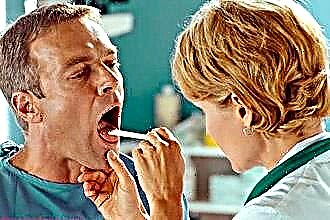Inflammation of the pharynx or pharyngitis is familiar to many patients firsthand. The disease has different forms and types of course, it is often repeated more than once during a lifetime. However, in this case, acute infectious and inflammatory processes of a viral and bacterial nature prevail. What pathology are we talking about if the doctor, after examination, diagnosed granulosa pharyngitis? How dangerous is this disease, on the basis of what symptoms can you suspect its presence on your own? Each patient should know about the main signs of granulosa inflammation of the pharynx and the methods of treatment used in this case.
What is granular pharyngitis and why does this disease occur? The fact that the inflammatory process in the pharyngeal region can be acute or chronic is known to many patients - as well as the existence of varieties of acute inflammation. However, not everyone knows that there are also several chronic forms, and granular pharyngitis is, in fact, synonymous with the definition of "hypertrophic pharyngitis". Its development can be facilitated by:
 acute infectious diseases of the upper respiratory tract;
acute infectious diseases of the upper respiratory tract;- foci of chronic infection in the upper respiratory tract;
- foci of chronic infection outside the boundaries of the respiratory system;
- immunodeficiencies of various etiologies;
- functional insufficiency of lymphoid formations of the oropharynx;
- surgical removal of palatine tonsils, pharyngeal tonsils.
The granular variant of pharyngitis is observed throughout life. The presence of a mixed form (a combination of hypertrophy with catarrhal inflammation, atrophy) is possible - the granular focus is concentrated in the region of the lymphoid formations of the pharynx. Constant irritation of the pharyngeal mucosa (smoking, dust, eating spicy, solid foods, contact with harmful substances), endocrine disorders, alcohol abuse, difficulty in nasal breathing and frequent use of nasal decongestants are important for the onset of the pathological process. Also, chronic inflammation of the pharynx can be associated with disorders of the digestive system.
Granular pharyngitis is manifested by hypertrophy of the mucous membrane and lymphoid tissue of the pharynx.
Patients do not always know about the presence of a chronic inflammatory process, since the disease without exacerbation is characterized by erased symptoms - they are often mistaken for a consequence of fatigue, contact with household detergents, tobacco smoke and dry air. Detection of signs characteristic of the granular form of pharyngitis can occur during an examination for a relapse of the disease.
Sometimes granules in the pharynx are detected as a result of a viral infection and persist for a long time. Whether such a symptom is considered a sign confirming chronic granular pharyngitis is decided by the attending physician.
Although granular pharyngitis is not severe, it can progress if left untreated, resulting in a worsening of symptoms. The disease does not pose a direct threat to life, but how chronic inflammation causes dysfunction of the pharynx and nearby organs, it requires clarification and elimination of the causes of development.
Signs of the disease
How does granular pharyngitis manifest? Symptoms should be described in accordance with the stage of the pathological process, since during the period of subsidence of manifestations and during the period of relapse, the disease has different signs.
Objective examination
 The mucous membrane of the pharynx is thickened, somewhat edematous, covered with mucus; large, rounded or oval red, red-pink follicles are raised above the reddened surface, which are considered as granules. They are also called "grains". With an exacerbation, edema and redness of both the mucous membrane and the follicles becomes clearly visible, and the accumulation of pus in the follicles is also possible.
The mucous membrane of the pharynx is thickened, somewhat edematous, covered with mucus; large, rounded or oval red, red-pink follicles are raised above the reddened surface, which are considered as granules. They are also called "grains". With an exacerbation, edema and redness of both the mucous membrane and the follicles becomes clearly visible, and the accumulation of pus in the follicles is also possible.
The main symptom that characterizes granular pharyngitis is granules - enlarged lymphadenoid follicles in the pharynx.
Out of exacerbation
Patients are worried about:
- Dry and lumpy throat.
- Feeling of irritation, tingling sensation of the mucous membrane.
- Moderate, more often insignificant difficulty in swallowing.
- Intermittent coughing, which may intensify dry, hot air, tobacco smoke.
- Sore throat on one side or on both sides - moderate, easily tolerated.
The general condition is not disturbed, all symptoms are not always present at the same time; often they appear periodically, the patient may not pay attention to them for a long time, associate with a variety of external causes.
Aggravation
Both local and general symptoms are present - all the previously described manifestations intensify, the pain becomes palpable - especially if the patient takes a sip, it can radiate into the ears (from one or both sides). Fever occurs (subfebrile, less often febrile), coughing may be accompanied by the release of scanty mucous or mucopurulent sputum.
Treatment
How is granular pharyngitis treated? To do this, use:
- correction of diet and eating habits;
- regular cleansing of the oropharynx;
- pharmacotherapy.
Correction of the diet is required for those patients who consume insufficient amounts of important nutrients - or choose foods that irritate the mucous membrane, adversely affecting the digestive system as a whole. These are alcohol, coffee, hot spices, fried, pickled dishes, various sweets. Correction of eating habits involves dividing food into small portions (eliminating discomfort when swallowing), eating at the same time.
Treatment for pharyngitis granulosis involves regular cleansing of the oropharynx - even if the symptoms are barely bothering.
Hygiene measures should be carried out after waking up and during the day after eating; to rinse the throat, use a solution of soda and / or salt of moderate concentration (from 1 to 2%). Also, as prescribed by a doctor during an exacerbation, you can use:
 Soda, saline solution.
Soda, saline solution.- Herbal remedies (chamomile, calendula, sage, Rotokan).
It may also be recommended to lubricate the mucous membrane with a solution of tannin, the use of local antiseptics (Strepsils, Faringosept). In addition, it is required to identify and treat foci of chronic infection (tonsillitis, sinusitis, etc.), since they serve as sources of constant reproduction of pathogenic microorganisms, cause intoxication, and create the prerequisites for the formation of immune disorders.
How to treat pharyngitis if the granules are very large? To eliminate discomfort, if indicated, destruction of enlarged follicles (for example, with a laser) can be recommended. In this case, the doctor may first recommend using conservative measures - granular pharyngitis, the treatment of which is successful, does not always require the removal of hypertrophied lymphadenoid tissue.
Prophylaxis
How to prevent hypertrophic granular pharyngitis? Preventive measures are relevant both at the stage of the absence of chronic inflammation and when establishing a diagnosis. In the first case, it is important to prevent the transition of the disease to a chronic form, in the second - to avoid relapses. To do this, you should:
- eliminate irritants (tobacco smoke, dust, sharp, solid, crumbling food);
- abandon the abuse of nasal vasoconstrictor drugs;
- balance the diet, if necessary, correct vitamin deficiencies;
- timely treatment of acute diseases of the upper respiratory tract;
- choose the therapy for diseases of the digestive and endocrine systems (in particular, gastroesophageal reflux disease, or GERD).
The patient should stop smoking and alcohol, while it is important to take into account not only active, but also passive smoking. It is necessary to carry out wet cleaning on time, regularly ventilate the room. In the presence of immunodeficiency, chronic infections, the cause should be found out, adequate therapy should be carried out.

 acute infectious diseases of the upper respiratory tract;
acute infectious diseases of the upper respiratory tract; Soda, saline solution.
Soda, saline solution.

